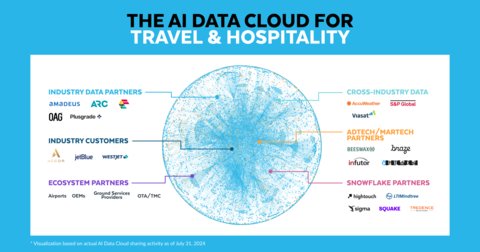Travel AI Innovations
Snowflake’s AI Data Cloud for Travel and Hospitality Drives AI Innovation, Enhances Collaboration, and Transforms Customer Experiences

Snowflake enables the travel and hospitality industry to harness the power of the AI Data Cloud to transform operations and deliver exceptional customer experiences
No-Headquarters/BOZEMAN, Mont., September 24, 2024–(BUSINESS WIRE)–Snowflake (NYSE: SNOW), the AI Data Cloud company, today announced the launch of the AI Data Cloud for Travel and Hospitality, uniting Snowflake’s data platform, AI capabilities, and industry-specific solutions to deliver best-in-class data insights for the travel and hospitality industry. Snowflake empowers airlines, hotels, cruise lines, and travel technology providers to harness data and artificial intelligence to improve operations and power five-star customer experiences across the sector.
As the travel and hospitality industry transitions from recovery to stable growth, businesses face new challenges and opportunities. Snowflake is uniquely positioned to support this growth, offering a unified platform that streamlines AI and ML development, providing top-tier security and governance capabilities, and democratizing data access. With robust data collaboration capabilities and effortless scalability, Snowflake enables organizations to harness their data’s full potential.
The AI Data Cloud for Travel and Hospitality addresses key industry trends and use cases, including dynamic pricing and sustainability tracking, developer efficiencies, reputation management, and performance advertising to help organizations across the industry both streamline operations and unlock new business value.
With Snowflake’s AI Data Cloud for Travel and Hospitality, businesses can build and optimize outcomes like:
-
Hyper-Personalized Marketing: Personalized, privacy-focused marketing campaigns resulting in accelerated customer acquisition and reduced acquisition costs
-
Improved Customer Experience: Optimized bot and Interactive Voice Response (IVR) performance plus preemptive messaging to reduce churn
-
Loyalty & Co-Branded Experiences: Modernized customer data management, streamlined alliance point management, optimized hotel and partner coordination, and customer vs. member 360 personalization to enhance customer retention and engagement
-
Reliable and Efficient Operations: Optimized routes and networks, simplified irregular operations (IROP) management, increased turn efficiencies, and improved crew coordination
-
Maximized Revenue Management: Optimized maintenance, repair, and overhaul (MRO) workstreams, fine-tuned scenario forecasting, optimized dynamic pricing, and focused ancillary revenue streams to drive profitability
Travel AI Innovations
Find Out How The AI Talent Race Can Transforms The Travel Sector: Here Is The Information You Should Know Now

Thursday, July 24, 2025
The rapid adoption of artificial intelligence (AI) has sparked intense competition for skilled professionals within the travel industry, reshaping how companies approach talent recruitment and technological advancement.
Major Travel Companies Increase AI Hiring
Key industry players, including Chase Travel, Airbnb, and Kayak, are significantly expanding their AI teams. Chase Travel is actively recruiting senior executives specializing in AI innovation. Airbnb is onboarding AI and machine learning engineers to enhance customer experiences and streamline operations. Additionally, Kayak is focusing on AI-driven SEO strategies, aiming to boost online engagement and visibility.
Fora Travel, recognized as a top startup by PhocusWire, is also joining the hiring spree, seeking creative AI professionals to sustain its competitive advantage.
Unprecedented Competition for AI Professionals
Julie Shainock, managing director at Microsoft, highlighted the exceptional nature of this current AI hiring surge. Traditionally, travel businesses found it difficult to attract technology specialists due to lower pay scales and perceptions of limited innovation. However, the emphasis on AI has dramatically changed this outlook.
High-profile cases, such as Meta reportedly attempting to attract OpenAI employees with significant financial offers—claims Meta later denied—illustrate the heightened intensity of AI talent recruitment.
Balancing Legacy Systems with AI Innovation
Lorraine Sileo, founder of Phocuswright Research, emphasized the unique challenge travel companies face. These businesses must simultaneously maintain legacy technologies while swiftly integrating cutting-edge AI solutions. Successfully navigating this balance is essential for maintaining relevance and competitive positioning.
Shift in Hiring Priorities
Christine Walsh from American Express GBT highlighted a strategic shift in recruitment practices. Historically, travel companies prioritized applicants with extensive industry-specific knowledge. Today, the focus is shifting towards general technological expertise, with organizations increasingly prepared to provide specialized industry training to new hires.
Proactive Investments in AI Technologies
Shainock and Walsh both stressed that current investments in AI technology go beyond mere discussions. Companies are integrating AI into various operational levels, significantly improving their appeal to tech-savvy job seekers. This comprehensive approach signals a robust commitment to innovation and technological advancement.
Boosting the Industry’s Appeal Post-Pandemic
Sileo recommended that travel businesses improve their messaging to highlight career stability and future opportunities in the wake of COVID-19. Additionally, offering competitive salaries and attractive benefit packages can further enhance the industry’s attractiveness to potential candidates.
Recommended Strategies to Attract AI Talent
Industry experts propose several targeted strategies to attract top-tier AI professionals:
- Establish AI Centers of Excellence: Shainock suggested creating specialized units that merge industry expertise with advanced AI knowledge. These centers would drive innovation, providing challenging and fulfilling career opportunities for skilled professionals.
- Foster an Innovative Company Culture: Organizations should actively cultivate and promote an environment encouraging creativity, experimentation, and continuous learning. Professionals are attracted to workplaces where their input significantly impacts innovation.
- Provide Clear Career Development Paths: Transparent and structured career pathways specifically focused on technological and AI skill development are essential. This clarity assures candidates of meaningful long-term career opportunities.
Internal Training as a Recruitment Tool
At American Express GBT, Walsh emphasized the value of comprehensive, customized AI training programs. These educational initiatives are created collaboratively by technology and human resource teams, equipping employees with relevant skills and clearly defined progression paths. Such training programs significantly enhance employee satisfaction and retention.
Demonstrating Commitment to AI Through Tangible Results
Walsh also stressed the importance of visibly integrating AI into products and services. Potential recruits seek clear evidence of a company’s technological commitment. Demonstrable AI applications within travel offerings reinforce a company’s credibility and appeal.
Unique Opportunities in Travel
Ultimately, the travel industry holds a distinctive appeal for AI professionals. Beyond automation, AI transforms customer experiences, operational efficiencies, and global inclusivity. These meaningful and tangible impacts attract ambitious professionals seeking innovative and rewarding careers.
As AI continues to revolutionize the travel industry, companies proactively investing in technological innovation and employee development will lead the charge into an exciting future, reshaping how the world explores and connects.
Travel AI Innovations
A major AI training data set contains millions of examples of personal data

The bottom line, says William Agnew, a postdoctoral fellow in AI ethics at Carnegie Mellon University and one of the coauthors, is that “anything you put online can [be] and probably has been scraped.”
The researchers found thousands of instances of validated identity documents—including images of credit cards, driver’s licenses, passports, and birth certificates—as well as over 800 validated job application documents (including résumés and cover letters), which were confirmed through LinkedIn and other web searches as being associated with real people. (In many more cases, the researchers did not have time to validate the documents or were unable to because of issues like image clarity.)
A number of the résumés disclosed sensitive information including disability status, the results of background checks, birth dates and birthplaces of dependents, and race. When résumés were linked to people with online presences, researchers also found contact information, government identifiers, sociodemographic information, face photographs, home addresses, and the contact information of other people (like references).
COURTESY OF THE RESEARCHERS
When it was released in 2023, DataComp CommonPool, with its 12.8 billion data samples, was the largest existing data set of publicly available image-text pairs, which are often used to train generative text-to-image models. While its curators said that CommonPool was intended for academic research, its license does not prohibit commercial use as well.
CommonPool was created as a follow-up to the LAION-5B data set, which was used to train models including Stable Diffusion and Midjourney. It draws on the same data source: web scraping done by the nonprofit Common Crawl between 2014 and 2022.
While commercial models often do not disclose what data sets they are trained on, the shared data sources of DataComp CommonPool and LAION-5B mean that the data sets are similar, and that the same personally identifiable information likely appears in LAION-5B, as well as in other downstream models trained on CommonPool data. CommonPool researchers did not respond to emailed questions.
And since DataComp CommonPool has been downloaded more than 2 million times over the past two years, it is likely that “there [are]many downstream models that are all trained on this exact data set,” says Rachel Hong, a PhD student in computer science at the University of Washington and the paper’s lead author. Those would duplicate similar privacy risks.
Good intentions are not enough
“You can assume that any large-scale web-scraped data always contains content that shouldn’t be there,” says Abeba Birhane, a cognitive scientist and tech ethicist who leads Trinity College Dublin’s AI Accountability Lab—whether it’s personally identifiable information (PII), child sexual abuse imagery, or hate speech (which Birhane’s own research into LAION-5B has found).
Travel AI Innovations
Transforming Corporate Travel: BCD’s Yannis Karmis on AI and SkyLink’s Innovations

Friday, July 18, 2025
In an insightful interview, Mr. Yannis Karmis, Senior Vice President of Product Planning & Development at BCD Travel, explores how AI-powered solutions, specifically SkyLink, are revolutionizing the corporate travel landscape within the broader hospitality and tourism industry. Mr. Karmis highlights SkyLink’s capacity to deliver smoother, smarter, and more personalized travel experiences by automating bookings, streamlining complex itineraries, and providing instant multilingual support directly within popular collaboration platforms such as Microsoft Teams and Slack.
Emphasizing the solution’s user-centric design, he discusses how SkyLink optimizes travel program compliance, balances cost efficiencies, and enhances traveler productivity through intuitive conversational interactions.
Moreover, Mr. Karmis addresses how SkyLink navigates regional challenges related to data privacy and compliance, particularly in European and Asian markets, ensuring global deployment aligns with local expectations and builds trust.
Looking ahead, he envisions AI playing an increasingly pivotal role in shaping corporate hospitality and travel management, combining automation with essential human oversight to deliver exceptional travel experiences and robust data intelligence.
How do you see AI-powered solutions like SkyLink transforming the corporate travel experience within the broader hospitality and tourism industry?
AI-powered solutions like SkyLink are making corporate travel smarter and smoother. By automating bookings, personalizing itineraries, and providing real-time support, they help companies save time and money while giving travelers a more seamless and stress-free experience.
SkyLink stands out by integrating directly into tools employees already use such as Microsoft Teams and Slack, offering a fully touchless experience that’s up to 10 times faster than traditional booking methods. It also boosts program compliance with real-time, dynamic recommendations based on company policy and market conditions.
In what ways does SkyLink enhance traveler productivity and satisfaction, especially for frequent business travelers navigating complex itineraries or last-minute changes?
SkyLink transforms the business travel experience by making it as easy as having a conversation. Travelers can describe what they need in plain language via chat or voice and book within seconds, even for complex, multi-city trips or repeat itineraries. It works right inside Microsoft Teams and Slack, so there’s no need to switch platforms. The traveler can @tag an assistant or travel arranger to join the conversation, and SkyLink will prompt hotel bookings at the right time, improving both attachment and advance booking rates.
SkyLink also flags major events, offering curated information on weather and policy, and responding instantly in multiple global languages. Whether the traveler is on his desktop or mobile, SkyLink remembers the conversation, so the traveler can pick up where he left off anytime without having to wait for an agent. And if plans change, the traveler can cancel or rebook trips, even those made outside SkyLink. It’s a flexible, intuitive solution that keeps frequent travelers productive, informed, and in control.
Can you elaborate on how SkyLink ensures travel policy compliance and cost optimization without compromising traveler comfort and personalization?
SkyLink offers the right balance between policy compliance, cost control, and traveler comfort. It uses smart nudges and real-time reminders to guide travelers toward in-policy choices, without disrupting their planning flow. By prompting hotel bookings at the right time, it improves attachment and advance booking rates, helping companies maximise their spend while making it extremely easy for the traveller. SkyLink also personalised recommendations to each traveler’s preferences, company policy, and trip context, so every option feels personal, yet compliant.
How does integrating SkyLink into platforms like Microsoft Teams and Slack reflect changing trends in digital engagement within the hospitality sector?
Integrating SkyLink into Microsoft Teams and Slack reflects a major shift in how travellers want to engage with travel tools – seamlessly and right where they already work. We’ve seen an increased appetite from our customers to try new travel technologies, whether our own internal solutions or third party partner solutions and AI has accelerated that interest. By meeting users in familiar platforms, SkyLink removes friction and makes adoption easy.
With the rise of autonomous booking tools, how does BCD Travel maintain the balance between human service excellence and automation in business travel?
Travel is deeply human and personal. While technology advancements help in reducing traveler friction, the human touch cannot never be replaced, especially in times of emergency. As a TMC, we’ll never lose sight of the importance of human connection. We see AI as an opportunity to help our people work smarter and faster, focusing on high-impact tasks that drive traveler (and client) satisfaction. Further, our technologies will always have the human oversight of technologists and business analysts to monitor and measure precision.
What unique challenges and opportunities does BCD face when introducing AI-powered travel assistants into different global markets, particularly in Europe and Asia?
Introducing AI-powered travel assistants like SkyLink into global markets brings both exciting opportunities and unique challenges. In regions like Europe and Asia, there’s strong interest in AI but also a heightened focus on data privacy, security, and compliance. While the technical onboarding is relatively straightforward, the review process can take longer due to thorough evaluations by clients’ security and compliance teams. That said, once we engage directly with these teams, progress tends to accelerate. The opportunity lies in meeting this demand with transparency, flexibility, and local sensitivity, ensuring we deliver innovation that aligns with regional expectations and builds trust.
Looking ahead, how does BCD Travel envision the role of AI in shaping the future of corporate hospitality and travel management over the next 3 to 5 years?
In the next 3 to 5 years, AI will play a key role in transforming corporate travel and hospitality. It’s moving beyond basic automation to deliver smarter, more personalized experiences, helping travelers get what they need faster, while helping companies manage costs and stay within policy. With real-time guidance, predictive insights, and easy integration into everyday tools, AI will help strike the right balance between traveler satisfaction and business goals. At BCD, we’re focused on building AI solutions that focus on agent efficiency, traveler satisfaction and data intelligence.
-

 Brand Stories6 days ago
Brand Stories6 days agoBloom Hotels: A Modern Vision of Hospitality Redefining Travel
-

 Brand Stories1 day ago
Brand Stories1 day agoCheQin.ai sets a new standard for hotel booking with its AI capabilities: empowering travellers to bargain, choose the best, and book with clarity.
-

 Destinations & Things To Do7 days ago
Destinations & Things To Do7 days agoUntouched Destinations: Stunning Hidden Gems You Must Visit
-

 AI in Travel7 days ago
AI in Travel7 days agoAI Travel Revolution: Must-Have Guide to the Best Experience
-

 Brand Stories3 weeks ago
Brand Stories3 weeks agoVoice AI Startup ElevenLabs Plans to Add Hubs Around the World
-

 Brand Stories2 weeks ago
Brand Stories2 weeks agoHow Elon Musk’s rogue Grok chatbot became a cautionary AI tale
-

 Destinations & Things To Do1 day ago
Destinations & Things To Do1 day agoThis Hidden Beach in India Glows at Night-But Only in One Secret Season
-

 Asia Travel Pulse3 weeks ago
Asia Travel Pulse3 weeks agoLooking For Adventure In Asia? Here Are 7 Epic Destinations You Need To Experience At Least Once – Zee News
-

 AI in Travel3 weeks ago
AI in Travel3 weeks ago‘Will AI take my job?’ A trip to a Beijing fortune-telling bar to see what lies ahead | China
-

 Brand Stories3 weeks ago
Brand Stories3 weeks agoChatGPT — the last of the great romantics












